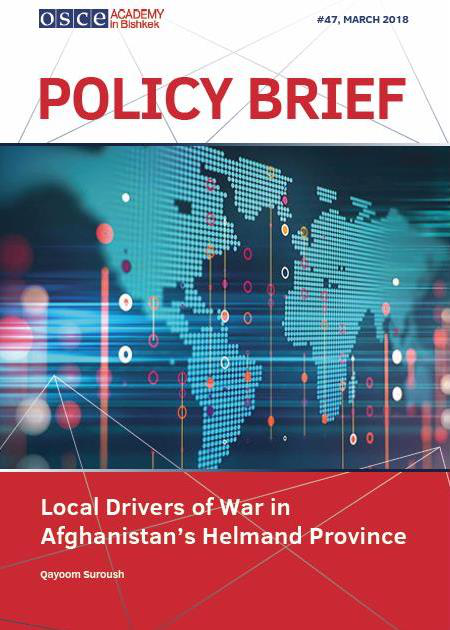News
Policy Brief №47 "Local Drivers of War in Afghanistan's Helmand Province"
On 6 March the OSCE Academy has released a new Policy Brief "Local Drivers of War in Afghanistan’s Helmand Province" by Qayoom Suroush. The Key points of the paper are:
• Violence and war in Afghanistan’s Helmand province have turned to a strategic and long-term policy by stakeholders, as a result of which there have not been a comprehensive program for improving public services and reforming local institutions to benefit the population;
• Available indicators point to overall popularity of the Taliban insurgents in Helmand. In contrast to what has commonly been believed, however, it is not the Taliban’s political message and their narrative of Islamic Sharia that attracts local communities to their rule, but the self-interest and economic benefits that entices the majority agrarian local population to support them;
• There are three important drivers of the conflict in Helmand—the strength and influence of local warlords, the factor of agricultural land rights, and the drug trade—together which they continue to keep the province as one of the most violent and insubordinate to central government authority in Afghanistan;
• The local population of Helmand both the elites and ordinary communities have reached an informal or undeclared alliance with the insurgent groups to maximize their interests. They use the alliance with insurgents as an instrument (a) to lobby for political power, and (b) to earn incomes and gain financial benefits from the drug trade and illicit economy.
A 2013 alumnus of the OSCE Academy with an MA in Politics and Security, Qayoom Suroush has worked as a researcher at Afghanistan Analyst Network where he has published, among other topics, on Afghanistan’s Ring Roads; Bamyan as first cultural capital of South Asia; Afghan public libraries; and national elections. Suroush has also worked as a Senior Advisor for Afghanistan National Security Council and is currently employed with Afghanistan Research and Evaluation Unit where he is assessing Afghanistan’s police reform and the programme of European Union’s Police Mission in Afghanistan. Suroush’s general research and academic interests are security, conflict, history, and Islamic studies.
Central Asia Policy Briefs are intended to foster interaction among policy, expert, and scholarly communities. There is no submission deadline as we accept proposals on the rolling basis. All details are here: http://osce-academy.net/en/research/policy-briefs/



 Русская версия
Русская версия